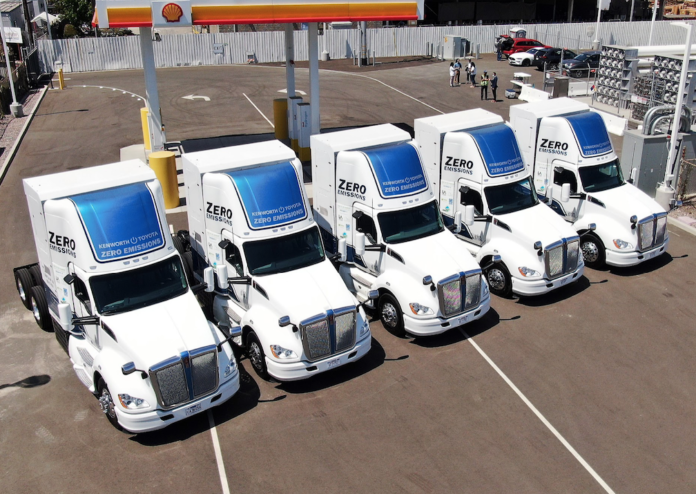The Port of Los Angeles and its partners say they are debuting five new hydrogen-powered fuel cell-electric vehicles (FCEVs) and celebrating the grand opening of two hydrogen fueling stations.
Under the $82.5 million Shore-to-Store (S2S) project, more than a dozen public and private sector partners have teamed up for a 12-month demonstration of the zero-emissions Class 8 trucks and will expand the project to include five more hydrogen-fueled heavy-duty trucks, two battery-electric yard tractors and two battery-electric forklifts.
The large-scale, multiyear demonstration is designed to advance the port’s Clean Air Action Plan goals and help California achieve statewide climate change, air quality improvement, and sustainability targets for reducing greenhouse gases and toxic air emissions. The project is designed to assess the operational and technical feasibility of the vehicles in a heavy-duty setting, as well as to expand infrastructure to support hydrogen throughout the region.
“Transporting goods between our port and the Inland Empire is the first leg of this next journey toward a zero-emissions future,” says Gene Seroka, executive director at the Port of Los Angeles. “This project is a model for developing and commercializing the next generation of clean trucks and cargo-handling equipment for the region and beyond. Just as the air we breathe extends beyond the port’s footprint, so should the clean air and economic benefits we believe this project will yield.”
The port’s technology development partners are Toyota Motor North America, which designed and built the powertrain’s fuel cell-electric power supply system; Kenworth Truck Co., which designed and built the Class 8 trucks with Toyota’s fuel cell-electric system; and Shell Oil Products US, which designed, built and will operate the project’s two new high-capacity hydrogen fueling stations in Wilmington and Ontario.
The vehicles’ duty cycles will consist of local pickup and delivery and drayage near the port and short regional haul applications in the Inland Empire. Partners will study the technical feasibility of hydrogen-fueled tractors and battery-electric cargo handling equipment operating under the demands of the Southern California market. At the same time, they will measure the reduction of nitrogen oxide, particulate matter and greenhouse gas emissions – as well as other pollutants.
The California Air Resources Board (CARB) is supporting the project with a matching grant of $41.1 million. Project partners are contributing the remaining $41.4 million in financial and in-kind support.




